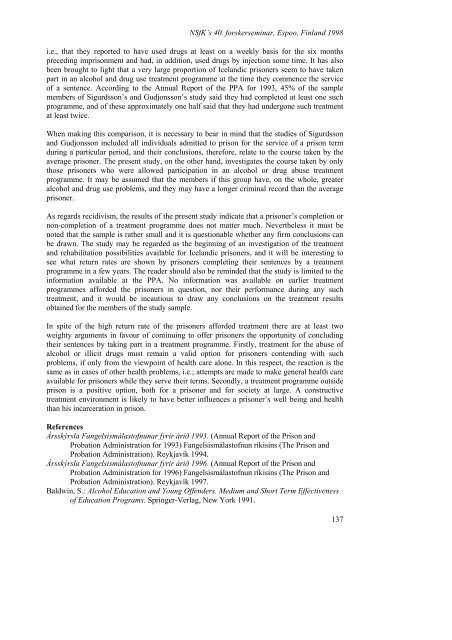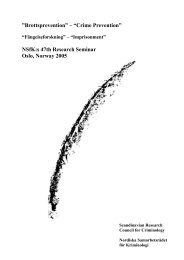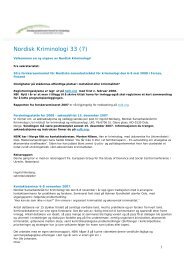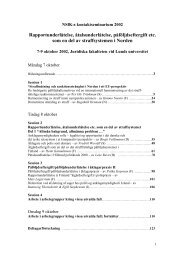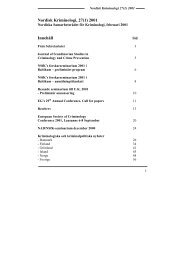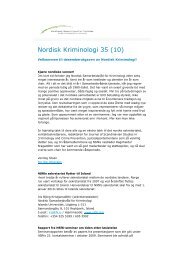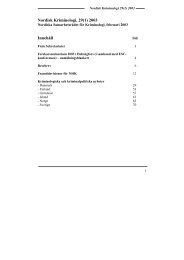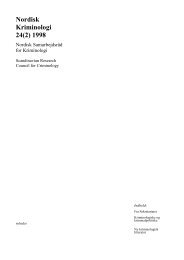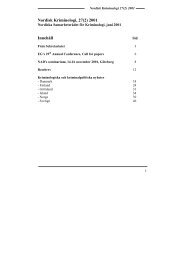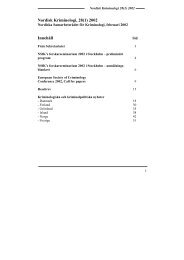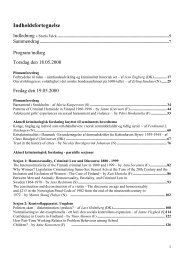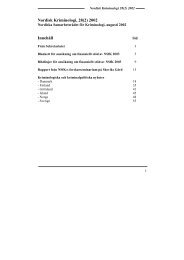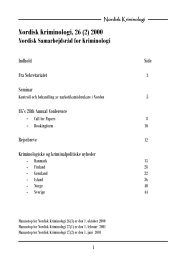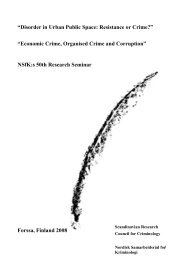Organised Crime & Crime Prevention - what works? - Scandinavian ...
Organised Crime & Crime Prevention - what works? - Scandinavian ...
Organised Crime & Crime Prevention - what works? - Scandinavian ...
You also want an ePaper? Increase the reach of your titles
YUMPU automatically turns print PDFs into web optimized ePapers that Google loves.
NSfK’s 40. forskerseminar, Espoo, Finland 1998<br />
i.e., that they reported to have used drugs at least on a weekly basis for the six months<br />
preceding imprisonment and had, in addition, used drugs by injection some time. It has also<br />
been brought to light that a very large proportion of Icelandic prisoners seem to have taken<br />
part in an alcohol and drug use treatment programme at the time they commence the service<br />
of a sentence. According to the Annual Report of the PPA for 1993, 45% of the sample<br />
members of Sigurdsson’s and Gudjonsson’s study said they had completed at least one such<br />
programme, and of these approximately one half said that they had undergone such treatment<br />
at least twice.<br />
When making this comparison, it is necessary to bear in mind that the studies of Sigurdsson<br />
and Gudjonsson included all individuals admitted to prison for the service of a prison term<br />
during a particular period, and their conclusions, therefore, relate to the course taken by the<br />
average prisoner. The present study, on the other hand, investigates the course taken by only<br />
those prisoners who were allowed participation in an alcohol or drug abuse treatment<br />
programme. It may be assumed that the members if this group have, on the whole, greater<br />
alcohol and drug use problems, and they may have a longer criminal record than the average<br />
prisoner.<br />
As regards recidivism, the results of the present study indicate that a prisoner’s completion or<br />
non-completion of a treatment programme does not matter much. Nevertheless it must be<br />
noted that the sample is rather small and it is questionable whether any firm conclusions can<br />
be drawn. The study may be regarded as the beginning of an investigation of the treatment<br />
and rehabilitation possibilities available for Icelandic prisoners, and it will be interesting to<br />
see <strong>what</strong> return rates are shown by prisoners completing their sentences by a treatment<br />
programme in a few years. The reader should also be reminded that the study is limited to the<br />
information available at the PPA. No information was available on earlier treatment<br />
programmes afforded the prisoners in question, nor their performance during any such<br />
treatment, and it would be incautious to draw any conclusions on the treatment results<br />
obtained for the members of the study sample.<br />
In spite of the high return rate of the prisoners afforded treatment there are at least two<br />
weighty arguments in favour of continuing to offer prisoners the opportunity of concluding<br />
their sentences by taking part in a treatment programme. Firstly, treatment for the abuse of<br />
alcohol or illicit drugs must remain a valid option for prisoners contending with such<br />
problems, if only from the viewpoint of health care alone. In this respect, the reaction is the<br />
same as in cases of other health problems, i.e.; attempts are made to make general health care<br />
available for prisoners while they serve their terms. Secondly, a treatment programme outside<br />
prison is a positive option, both for a prisoner and for society at large. A constructive<br />
treatment environment is likely to have better influences a prisoner’s well being and health<br />
than his incarceration in prison.<br />
References<br />
Ársskýrsla Fangelsismálastofnunar fyrir árið 1993. (Annual Report of the Prison and<br />
Probation Administration for 1993) Fangelsismálastofnun ríkisins (The Prison and<br />
Probation Administration). Reykjavík 1994.<br />
Ársskýrsla Fangelsismálastofnunar fyrir árið 1996. (Annual Report of the Prison and<br />
Probation Administration for 1996) Fangelsismálastofnun ríkisins (The Prison and<br />
Probation Administration). Reykjavík 1997.<br />
Baldwin, S.: Alcohol Education and Young Offenders. Medium and Short Term Effectiveness<br />
of Education Programs. Springer-Verlag, New York 1991.<br />
137


